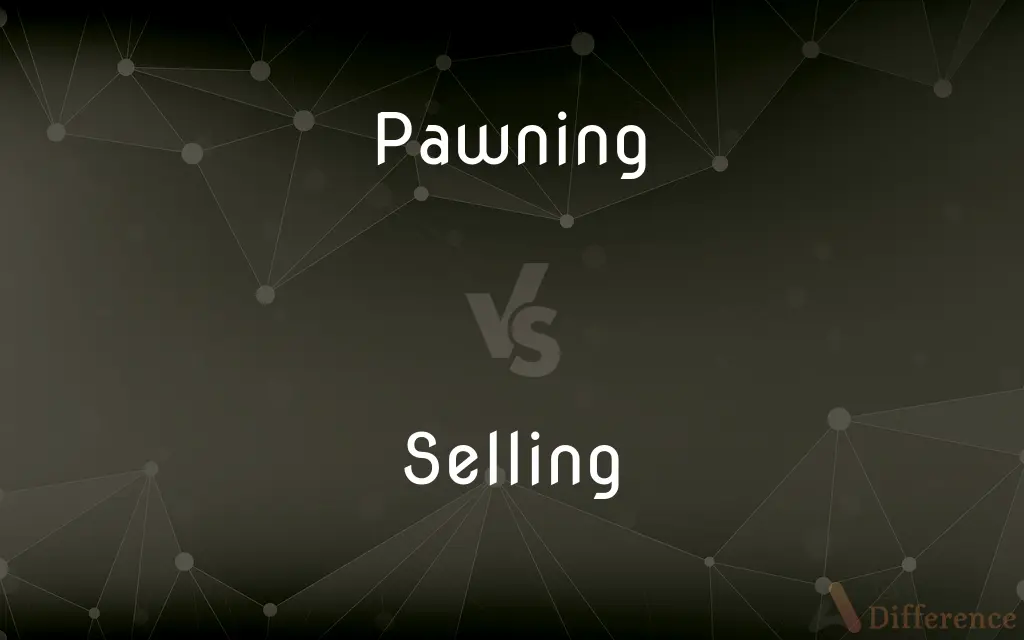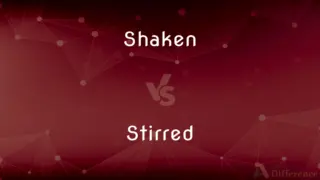Pawning vs. Selling — What's the Difference?
Edited by Tayyaba Rehman — By Fiza Rafique — Updated on March 25, 2024
Pawning involves using an item as collateral for a loan, while selling means transferring ownership for money. Pawning can reclaim the item, but selling is final.

Difference Between Pawning and Selling
Table of Contents
ADVERTISEMENT
Key Differences
Pawning is a process where you temporarily hand over possession of an item to a pawnbroker in exchange for a loan. The item serves as collateral, and you have the option to reclaim it by repaying the loan within a certain period. On the other hand, selling involves permanently transferring ownership of an item to another party in return for money, with no expectation of getting the item back.
When you pawn an item, the amount of money you receive is based on the pawnbroker's assessment of the item's value and the likelihood of you repaying the loan. Whereas, when selling, the price is determined by the item's market value, buyer's interest, and your negotiation skills.
Pawning is typically used as a short-term financial solution, allowing individuals to get immediate cash without permanently losing their possessions. In contrast, selling is a way to permanently dispose of items that are no longer wanted or needed, converting them into cash.
Interest and fees are associated with pawning, as the pawnbroker assumes the risk of loaning money against the item's value. These costs can make it expensive to reclaim the pawned item. Conversely, selling incurs no additional costs beyond any platform or transaction fees, leading to a clear, one-time exchange of goods for money.
The decision to pawn or sell can be influenced by the individual's attachment to the item and their financial needs. Pawning offers a way to retain the possibility of reclaiming a cherished or valuable item, while selling is a definitive action with no option for recovery.
ADVERTISEMENT
Comparison Chart
Purpose
To secure a short-term loan using an item as collateral.
To permanently transfer ownership of an item for money.
Transaction Type
Temporary, with the option to reclaim the item.
Permanent, with no option to reclaim.
Financial Implication
Involves interest and fees, potentially expensive to reclaim.
One-time transaction, potentially involving platform or transaction fees.
Value Determination
Based on pawnbroker's assessment for loan purposes.
Based on market value and negotiation.
Suitability
Ideal for short-term financial needs without losing possession permanently.
Suitable for disposing of unwanted items and converting them to cash.
Compare with Definitions
Pawning
Pawning is securing a loan by leaving an item of value with a pawnbroker.
He considered pawning his watch to cover unexpected expenses.
Selling
Selling is the act of transferring ownership of an item for money.
She sold her old books online to make extra cash.
Pawning
Pawning offers immediate cash without relinquishing ownership permanently.
Pawning his laptop provided him with quick cash for the weekend.
Selling
Selling determines the item's price through market value and negotiation.
He got a good price for his painting by negotiating with the buyer.
Pawning
It involves a temporary transaction where the item can be reclaimed.
She pawned her guitar but planned to get it back after her next paycheck.
Selling
Selling is suitable for converting unwanted items into cash.
They decided to sell their unused furniture before moving.
Pawning
Pawned items serve as collateral until the loan is repaid.
Her jewelry remained in the pawnshop as collateral for the loan.
Selling
It is a permanent transaction with no option to reclaim the item.
After selling his car, he started using public transport.
Pawning
Pawning is subject to interest and fees determined by the pawnshop.
The interest on pawning his vintage camera seemed reasonable.
Selling
The process involves finding a buyer interested in purchasing the item.
She posted ads online to find buyers for her handmade crafts.
Pawning
Something given as security for a loan; a pledge or guaranty.
Selling
To exchange or deliver for money or its equivalent
We sold our old car for a modest sum.
Pawning
The condition of being held as a pledge against the payment of a loan
Jewels in pawn.
Selling
To offer or have available for sale
The store sells health foods.
Pawning
A person serving as security; a hostage.
Selling
To give up or surrender in exchange for a price or reward
Sell one's soul to the devil.
Pawning
The act of pawning.
Selling
To be purchased in (a certain quantity); achieve sales of
A book that sold a million copies.
Pawning
To give or deposit (personal property) as security for the payment of money borrowed.
Selling
To bring about or encourage sales of; promote
Good publicity sold the product.
Pawning
To risk; hazard
Pawn one's honor.
Selling
To cause to be accepted; advocate successfully
We sold the proposal to the school committee.
Pawning
The act by which something is pawned.
Selling
To persuade (another) to recognize the worth or desirability of something
They sold me on the idea.
Pawning
Present participle of pawn
Selling
To exchange ownership for money or its equivalent; engage in selling
Are any of the fruit vendors still selling?.
Selling
To be sold or be on sale
Grapes are selling high this season.
Selling
To attract prospective buyers; be popular on the market
An item that doesn't sell.
Selling
To be approved of; gain acceptance
An idea that just wouldn't sell.
Selling
An act or instance of selling
Ordered a sell of his shares in the company.
Selling
Something that sells or gains acceptance in a particular way
Their program to raise taxes will be a difficult sell.
Selling
(Slang) A deception; a hoax.
Selling
Action of the verb to sell.
Buyings and sellings
Selling
Skill at salesmanship.
You've got to work on your selling.
Selling
Present participle of sell
Selling
The exchange of goods for an agreed sum of money
Common Curiosities
What is pawning?
Pawning is a process of borrowing money by leaving something valuable as security with a pawnbroker.
Can I get my item back after pawning?
Yes, you can reclaim your pawned item by repaying the loan and any associated interest or fees within the agreed period.
How is the value of a pawned item determined?
The pawnbroker assesses the item's value based on its condition, market demand, and potential to sell if the loan is not repaid.
How do I set a price when selling an item?
The selling price is usually determined by the item's market value, condition, and how much a buyer is willing to pay.
What does selling mean?
Selling involves transferring ownership of an item to another person in exchange for money.
Are there any fees associated with pawning?
Yes, pawning involves interest and possibly other fees, which can vary by pawnshop.
Do I incur any costs when selling an item?
Selling may involve transaction or platform fees, especially if selling online or through certain services.
What happens if I can't repay a pawnshop loan?
If you cannot repay the loan, the pawnshop keeps the item and may sell it to recover the loan amount.
How quickly can I get money from pawning?
Pawning offers immediate cash once the item is assessed and the loan amount is agreed upon.
Is selling an item reversible?
No, once an item is sold, the transaction is final, and you cannot reclaim the item.
Is pawning a good option for long-term financing?
Pawning is generally considered a short-term financial solution due to the high interest and fees.
Can I negotiate the price when selling an item?
Yes, price negotiation is common when selling items, especially in private sales or online marketplaces.
Is it better to pawn or sell for quick cash?
If you want the option to reclaim your item, pawning is better; for a final transaction without reclaiming, selling is preferable.
What types of items can I pawn or sell?
Common items include jewelry, electronics, musical instruments, and collectibles, but it varies based on the pawnshop or marketplace.
How long does it take to sell an item?
The time it takes to sell an item can vary widely based on the item, price, and selling platform.
Share Your Discovery

Previous Comparison
Fellowship vs. Fraternity
Next Comparison
Shaken vs. StirredAuthor Spotlight
Written by
Fiza RafiqueFiza Rafique is a skilled content writer at AskDifference.com, where she meticulously refines and enhances written pieces. Drawing from her vast editorial expertise, Fiza ensures clarity, accuracy, and precision in every article. Passionate about language, she continually seeks to elevate the quality of content for readers worldwide.
Edited by
Tayyaba RehmanTayyaba Rehman is a distinguished writer, currently serving as a primary contributor to askdifference.com. As a researcher in semantics and etymology, Tayyaba's passion for the complexity of languages and their distinctions has found a perfect home on the platform. Tayyaba delves into the intricacies of language, distinguishing between commonly confused words and phrases, thereby providing clarity for readers worldwide.
















































